|
|
|
Sort Order |
|
|
|
Items / Page
|
|
|
|
|
|
|
| Srl | Item |
| 1 |
ID:
133536
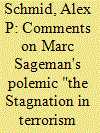

|
|
|
|
|
| Publication |
2014.
|
| Summary/Abstract |
Marc Sageman's lamenting about the "Stagnation in Terrorism Research" stands in stark contradiction to my conclusion in the Routledge Handbook of Terrorism Research (2011) that "Terrorism Studies-despite many shortcomings-has matured" and that "Terrorism Studies has never been in better shape than now." 1 While I agree with much else of what Marc Sageman says, there are a few points I disagree with. To begin with the notion of "stagnation": Terrorism Studies began, with few exceptions (Crozier, 1960; Thornton, 1964; Walter, 1964, 1969; Gaucher, 1965), 2 in the 1970s. Yet there had never been a period of real bloom in the 20th century-something which logically should precede the alleged stagnation after 9/11. As Andrew Silke noted in 2006:
|
|
|
|
|
|
|
|
|
|
|
|
|
|
|
|
| 2 |
ID:
178925
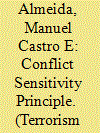

|
|
|
|
|
| Summary/Abstract |
This article explores how best practice in conflict research can address some of the key gaps and limitations of the terrorism research field with regards to research ethics. It draws from conflict research literature, as well as the authors’ primary research experience in Fragile and Conflict-Affected States (FCAS) and in the policy-oriented field of Preventing and Countering Violent Extremism (P/CVE). The analysis focuses on “conflict sensitivity” and the methodological approaches that have been developed and refined under the framework of that principle, including Systems Conflict Analysis. We seek to demonstrate how the integration of research methods related to conflict sensitivity represents an appropriate and fitting research agenda, through which relevant limitations of terrorism research can be addressed. This research agenda emphasizes, among other aspects, the need for solid primary research grounded in a detailed understanding of the local context, a departure from the narrow understanding of the Do No Harm principle in terrorism research, and a greater awareness about the relationship between research ethics and research methods.
|
|
|
|
|
|
|
|
|
|
|
|
|
|
|
|
| 3 |
ID:
133535


|
|
|
|
|
| Publication |
2014.
|
| Summary/Abstract |
Have you heard the story about the Englishman lost in an Irish mist trying to find the route to Limerick? He reaches a country crossroads, and asks an old man for directions; after much thought the old man's answer is, "If I were you I wouldn't start from here." From Sageman's account, you might in many ways infer that's the story of much contemporary terrorism research, and is, it seems to me, the unstated fundamental assumption behind his paper-if we had the freedom to start from scratch, if we were designing an area of study to investigate how violence is used to do things to influence political decision making, we'd probably want to conduct ourselves in a different way than we have. But we are where we are. Whether we like it or not, in studying terrorism and the terrorist, we engage with a world in which governments, officials, and politicians largely define the agenda (and keep changing it), set the rules for risk tolerance, and to a large extent control the money and through the choices they make direct research agendas.
|
|
|
|
|
|
|
|
|
|
|
|
|
|
|
|
| 4 |
ID:
189333
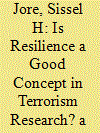

|
|
|
|
|
| Summary/Abstract |
Resilience has been suggested as a unifying concept in terrorism research. This article investigates the conceptual adequacy of resilience applied to terrorism. The framework for criteria for conceptual adequacy was applied on the academic literature that deals with the meaning of terrorism resilience. The conclusion of this study is that at its current state resilience serves more the role of cultural metaphor than that of a well-developed scientific concept. The almost endless definitions of resilience and lack of coherence in the descriptions of attributes is a warning signs to terrorism researchers that, if not careful with its usage, the resilience concept can end up more as a utopian goal than an actual means for countering terrorism.
|
|
|
|
|
|
|
|
|
|
|
|
|
|
|
|
| 5 |
ID:
133540
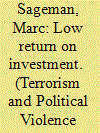

|
|
|
|
|
| Publication |
2014.
|
| Summary/Abstract |
First, I would like to thank David Rapoport for making this exchange possible. It is an important aspect of scholarly debate that has been missing from terrorism research. I also wish to thank the authors of the comments on my article on the stagnation on some part of terrorism research. I appreciate their kind words about my past work. Such praise coming from colleagues I truly esteem, and from whom I've learned so much, means a lot to me. However, I would also like to correct their impression about my mood. Far from being gloomy or pessimistic, I took to survey the area of terrorism research in order to see where we are and what we should do as a collegium. What should we do to improve terrorism research? Let me address each of the commentators in the order I read them.
|
|
|
|
|
|
|
|
|
|
|
|
|
|
|
|
| 6 |
ID:
133537


|
|
|
|
|
| Publication |
2014.
|
| Summary/Abstract |
Anyone who cares about both the national security threat arising from transnational al Qaeda-inspired terrorism and the need to develop a measured, effective response to this threat owes a great deal of gratitude to Marc Sageman. He was an early teller of inconvenient truths. As he notes in his essay, the tumultuous years following 9/11 were marked by the rise and mass dissemination of wild, ahistorical, and anecdote-based theories about the causes and possible solutions to violence motivated by the virulent ideology propagated by Sayyid Qutb in the 1950s and tragically brought to our shores by Osama bin Laden. Sageman insisted, however, that theory must be supported by evidence. He presented the facts as he saw them without regard to those he was undercutting on each side of the political spectrum. Over a decade after 9/11, his work has withstood the test of time and had a significant positive impact on our understanding of why al Qaeda attacked us and our policies for confronting this threat.
|
|
|
|
|
|
|
|
|
|
|
|
|
|
|
|
| 7 |
ID:
108033
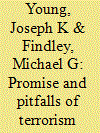

|
|
|
|
|
| Publication |
2011.
|
| Summary/Abstract |
Using a database of recent articles published in prominent political science journals, we show the rapid increase in terrorism research. Given this increased awareness and attention, we identify several problems that still plague the study of political terrorism including definitional problems that lack empirical tests, not distinguishing among different types of terrorism, and using the wrong unit of analysis when designing research. After identifying these problems-especially as they relate to the quantitative study of terrorism-we suggest some solutions. We then apply these suggestions to investigate whether changing the definition of terrorism, different types of terrorism, or changing the unit of analysis affects key predictors of terror events cross-nationally. One of our tests consists of varying the unit of observation to include directed dyads, which offers the potential to test some of the many strategic models of terrorism. Our analysis suggests that varying definitions of terrorism, such as military vs. non-military targets, might not be that consequential, whereas different types of terrorism, such as domestic vs. transnational, could be driven by fundamentally different processes. We also conclude that modeling transnational terrorism differently using directed dyads yields new and interesting insights into the process of terrorism.
|
|
|
|
|
|
|
|
|
|
|
|
|
|
|
|
| 8 |
ID:
133539


|
|
|
|
|
| Publication |
2014.
|
| Summary/Abstract |
Dr. Sageman makes a good point that despite the influx of government funding in the last decade, terrorism scholars have not been able to answer what he calls a "simple question"-what leads a person to turn to political violence? But Dr. Sageman's conclusion that scholars' inability to answer this question is evidence of stagnation in the field is incorrect. First, most scholars who study terrorism are addressing risk factors for terrorism at the level of societies, not individuals, so it is hardly surprising that there is no "consensus answer" to Dr. Sageman's question. Second, the question Dr. Sageman poses about individual level decision-making is not at all simple to assess. It is difficult to make gross generalizations about what leads individuals to do what they do in any area of life; difficulty in answering this question is not unique to terrorism experts. Consider analogous questions about individual decision-making with regard to other life choices. Despite significantly more than a decade of study, neither scientists nor humanists have been able to explain, ex ante, what leads a person to fall in love, to murder another, or to choose a particular career path (as a terrorist, or otherwise). A detailed study of an individual's life history might enable scholars to propose ex post hypotheses as to why that individual chose a career as a terrorism expert rather than as a terrorist, but even then, experts from varying disciplines (including psychiatry) would focus on different parts of the problem, seen through different lenses. It is not clear why Dr. Sageman holds terrorism scholarship to a standard that no other group of scholars aiming to understand and predict human behavior has yet been able to achieve.
|
|
|
|
|
|
|
|
|
|
|
|
|
|
|
|
| 9 |
ID:
133538
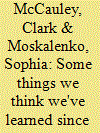

|
|
|
|
|
| Publication |
2014.
|
| Summary/Abstract |
It is a pleasure to have this opportunity to respond to a distinguished colleague's concerns about the progress of terrorism research since the 9/11 attacks. Marc Sageman sees little progress and identifies numerous impediments to research, notably including lack of good data and over-reliance on formal modeling
|
|
|
|
|
|
|
|
|
|
|
|
|
|
|
|
| 10 |
ID:
178913
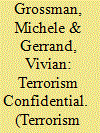

|
|
|
|
|
| Summary/Abstract |
Primary human sources involved with or proximate to terrorist actors can provide critical information and insights for understanding terrorist ideologies, behaviors and orientations. Yet accessing and drawing on their knowledge and experience is bound up with a range of constraints and risks. Some of these are practical, but others are either ethical, moral or both. Terrorism research can be constructed as a moral field of enquiry insofar as it proposes to generate scientifically defendable and socially useful knowledge that will help repel or mitigate the personal, social and political harms of terrorism in ways that respect human rights and freedoms. In turn, this potentially positions terrorism researchers as moral agents engaged in knowledge production for the greater collective social and political good. However, assuming the general moral orientation of terrorism researchers does not really help us understand how terrorism researchers navigate moral complexity or moral competition when faced with irreconcilable or asymmetrical ethical frameworks that can come into conflict. Indeed, terrorism researchers can become (drawing on Emmanuel Levinas’s distinction between ethics and morality) caught between “ethical” responsibility for participants on the one hand, and “moral” responsibility for the greater good, on the other. One potential response to this lies in constructing what might be called “necessary fictions” in how we represent our primary human data. However, what look like “necessary fictions” from an ethical standpoint—mitigating the vulnerability of participants through taking ethical responsibility for the others we encounter—can become shaky ground from a moral standpoint when benchmarked against expectations governing facticity and authenticity in social science research. This is a wicked problem for terrorism research: in seeking ethically to minimize vulnerabilities for participants, do such strategies create other and deeper moral vulnerabilities for the field? This paper will attempt to unpack these issues drawing on our own recent research experiences in the field of countering violent extremism.
|
|
|
|
|
|
|
|
|
|
|
|
|
|
|
|
| 11 |
ID:
131359
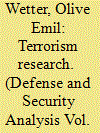

|
|
|
|
|
| Publication |
2014.
|
| Summary/Abstract |
In terrorism research, three different sources of information and data exist: the terrorists and their environment; the incidents; and the population. This article discusses the strengths and weaknesses of research that is concerned with, or relies on, any of the mentioned sources. An in-depth understanding of the methodological issues that come with these sources is important to correctly interpret results from scientific studies. It is highlighted how the different scientific approaches add to a holistic view of terrorism as a phenomenon. Furthermore, the double-edged sword of information in the field of terrorism is discussed. From these deliberations, guidance concerning the future work of both scholars and decision-makers can be deducted.
|
|
|
|
|
|
|
|
|
|
|
|
|
|
|
|
| 12 |
ID:
140866
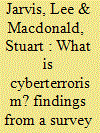

|
|
|
|
|
| Summary/Abstract |
This article reports on a recent survey designed to capture understandings of cyberterrorism across the global research community. Specifically, it explores competing views, and the importance thereof, amongst 118 respondents on three definitional issues: (a) the need for a specific definition of cyberterrorism for either policymakers or researchers; (b) the core characteristics or constituent parts of this concept; and (c) the value of applying the term “cyberterrorism” to a range of actual or potential scenarios. The article concludes by arguing that while a majority of researchers believe a specific definition of cyberterrorism is necessary for academics and policymakers, disagreement around what this might look like has additional potential to stimulate a rethinking of terrorism more widely.
|
|
|
|
|
|
|
|
|
|
|
|
|
|
|
|
|
|
|
|
|